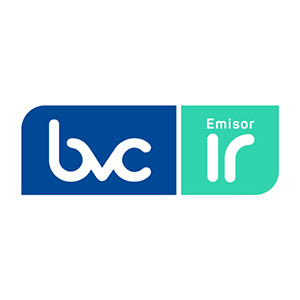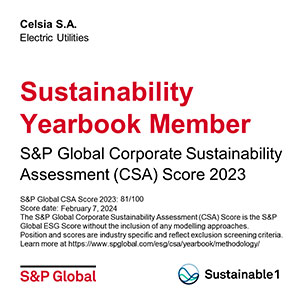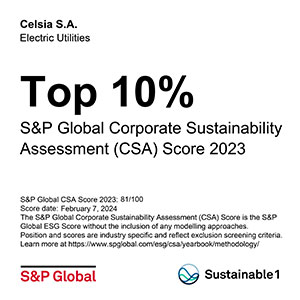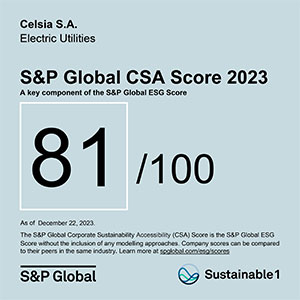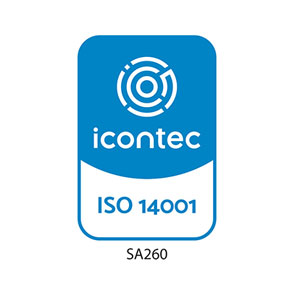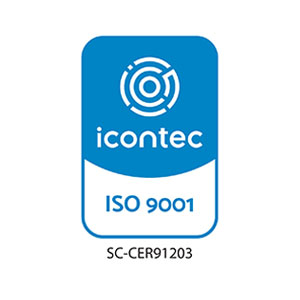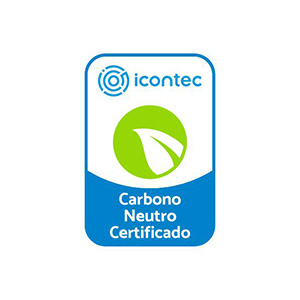At Celsia, more than a company, we are partners of development. We work hand in hand with communities, enriching lives and supporting social progress.
GRI (3-3) Social management at Celsia contributes to the sustainability of the business and the feasibility of future developments. We carry out this process together with the “communities,” one of our key stakeholders, and is based on:
- The knowledge of the different social actors that make up this stakeholder and its context.
- The design of particular engagement strategies to build and strengthen mutually beneficial relationships based on respect and trust.
- Proper information, participation and consultation processes in matters arising from our operations that may eventually affect them positively or negatively.
Moreover, this process allows us to identify, prioritize, plan and implement social collective benefit initiatives that contribute to the integral development of the territories in which we are present.
We work every day to strengthen social management and adapt to the new dynamics and needs observed in the scenarios where we operate. This is how we guarantee the sustainability of our business through responsible and inclusive actions.
Our Management
GRI (3-3) Social management, in addition to contributing to the permanence and sustainability of the business, positively impacts the “communities” stakeholder, as it guarantees:
- Knowledge of the environments where we operate (characteristics and needs) and their organizational structures according to type of community (ethnic and non-ethnic). Therefore, we adjust processes to their particularities, guided by the principles of inclusion and respect.
- Participation of social actors in aspects of our operations that may affect them, to take them into account and integrate their knowledge and points of view.
- The execution of prioritized, agreed upon and social investment actions aimed at addressing some needs in the territories for collective benefit and comprehensive development.
Health and Safety of the Communities in Our Area of Influence
This is an aspect analyzed in the processes of identifying the impacts of our operations, where to date no direct impacts on the health of the communities have been recorded. However, as part of our preventive culture in construction projects, we implement actions of:
- Epidemiological monitoring with experts, to monitor health issues derived from the floating population during the construction stage.
- Prevention and health promotion brigades in partnership with local institutions responsible and competent in these matters. Although the general community in our areas of influence can access these activities, they are focused on women and children.
Furthermore, we are linked, through our social investment, to some strategic projects, such as:
- Health infrastructure (construction and/or improvement).
- Provision of equipment and supplies.
- Delivery of clay filters and intervention in community aqueducts, which contribute to improving water conditions for human consumption, reducing the number of gastrointestinal diseases.
- Development of productive projects that contribute to the improvement of economic conditions, food security and, consequently, people’s health.
GRI (3-3) (2-23) (2-24) (2-25) At Celsia, we define and implement corporate guidelines for social management based on procedures, guides and instructions that establish the principles of engagement and action developed by our operational socio-environmental teams in the areas of influence, as follows:
Characterization
Dialogue
Relationship
Local development
- Hiring local labor, goods and services.
- Social investment projects and processes framed in our lines of investment.
- Partnerships with public and private institutional actors.
- Cooperation agreements with communities through their official organizations, for them to develop some of their projects, strengthen their management capacity and take care of resource management.
- Information to communities regarding TSE resources generated by our operation and training, which enables them to manage them.
- Projects under the modality of Works for Taxes to address needs prioritized by the communities in our areas of influence.
We do all of the above based on the legislation of each country in which we carry out our activities, the IFC 2012 performance standards, ILO Convention 169 and the Universal Charter of Human Rights.
Social Investment Strategy
GRI (413-1) Social investment is based on knowledge of our communities and their environments and includes voluntary and mandatory actions defined in direct consultation processes with the communities, in coherence with our social policy, organizational principles and values.
Mandatory investments
are actions that address the impacts of the construction, operation and maintenance of the organization’s projects and assets. They may be the result of an agreement in a prior consultation, social measures of an EMP, provisions of environmental authorities and/or legal requirements.
Voluntary investments
are common benefit initiatives that address pre-existing situations in the territories, not related to the impacts of our operations, and become opportunities to be partners in their development, creating social value.
All our social investments are framed within four strategic lines:
Improving Quality of Life
Community infrastructure, health and environment, culture, recreation and sports.
Promoting Education
School infrastructure, environmental education, provision of educational implements and school kits, and strengthening teachers’ skills.
Community Development
Strengthening grassroots organizations, productive projects and citizen participation mechanisms.
Access to Power
Electrification with our own resources, project management before funds, actions that promote the efficient energy use, standardization of connections and improvement of internal networks.
Below, we present the details of our social investments:
Priorities and Key Indicators of our Social Investment
Click on the tabs for additional details.
We promote the efficient use of and access to power through expansion and/or electrification projects, standardization of connections and construction of new energy generation projects.
ODS 7 Affordable, clean energy.
This line contemplates energy efficiency practices and helps populations access power, either through connection standardization processes, traditional electrification with our own resources or government funds, or alternative energy projects.
In this way, the organization:
- Expands service coverage.
- Protects natural resources necessary for generating power, as it reduces pressure on forests.
- Strengthens strategic partnerships to optimize resources and expand coverage and beneficiaries in the development of projects in this line.
- Makes progress in implementing clean energy that helps take care of the environment.
- Helps reduce losses, adjust consumption to customers’ payment capacity and prevent risks.
- Makes new projects to increase installed capacity and deliver more energy to our stakeholders (communities and clients)
- Due to the reorganization of our presence in Central America and the divestment of some assets, our total installed capacity in 2023 showed a decrease. However, photovoltaic installed capacity increased by 63%, which corresponds to 121 MW.
- he expansion of our territorial coverage, with 591 more kilometers of distribution network in 2023.
to contribute to our assets’ optimal operation.
in energy access projects.
of our projects in various municipalities and villages in the departments of Tolima and Valle del Cauca:
with three energy access projects.
These investment actions allow us to create social value because:
- We contribute to improving the living conditions of our communities and customers.
- We help prevent risks associated with the provision of service due to poor conditions of internal electrical networks.
- We help our clients improve energy use, be more aware and adjust their payment capabilities.
We strengthen capacities and skills in communities, for their contribution to local development and to strengthen productive units according to the vocation of their territory.
ODS 11 Sustainable cities and communities.
With this line, we contribute:
- Strengthen the productive capacities and vocations of the communities, contributing to their economic development and creating a favorable environment for business continuity.
- To the development of productive projects.
- To the prioritization of labor, goods and local services to boost the economy and contribute to territorial development.
This line allows us to:
- Promote mutually beneficial relationships in the environments in which we operate.
- Strengthen the productive capacities and vocations of the communities, their economic development and a favorable environment for business continuity.
- Promote dialogue and agreement processes between the different social actors in the territories where we operate.
35 due to situations arising from construction activities, prior consultation and/or impacts on projects, and three about assets in operation (one in Central America).
- the rest of complaints have been closed.
affected the operation and development of projects in 2023
with prior consultation processes
- Communities and community councils in our areas of influence, in 20 municipalities in nine departments of Colombia.
- Capacity building in the communities of the areas of influence for: development of their productive processes, management, leadership, entrepreneurship, self-employment and income generation:
(based on the agricultural and livestock vocation of the territories), in 30 communities in 6 departments.
in 9 departments and more than 9,500 people benefited.
- Contribution to the economic and social development of the territories:
from community development projects.
We carry out actions to improve educational quality in our areas of influence, with school infrastructure projects and strengthening the capacities of teachers.
ODS 4 Quality Education.
This line contributes to educational quality, as it improves schools in terms of energy, water and physical infrastructure and qualifies teachers in their pedagogical practices. In this way, the company is able to:
- Stimulate local economic development, which, in turn, promotes greater energy demand.
- Strengthen relationships with the community.
- Generate better commitments, which guarantee a favorable environment for developing operations.
- Foster a sense of ownership and sustainable relationships by contributing to the education of children and young people with a vocation for leadership as development managers and community leaders of their territory in the medium and long-term.
- Strengthen the pillars of the Celsia culture and the organizational climate through their link to the actions promoted by corporate volunteering.
participated in corporate volunteer sessions related to promoting education.
in corporate volunteer activities related to promoting education.
The generation of school, management and leadership capacities in the communities of the areas of influence:
with the development of the foundation’s school infrastructure works.
who demonstrated greater school management and leadership.
were intervened to improve school environments,
from educational programs and projects.
Prior Consultations
At the end of the year, we maintained prior consultation processes with 200 ethnic communities in their different stages:
These 200 communities are made up of 162 indigenous communities (reservations, councils, subdivisions) and 38 community councils of black communities, distributed in 20 municipalities of the departments of Valle del Cauca, Tolima, Cauca, Bolívar, Sucre, Córdoba, Cesar, Atlántico and La Guajira.
Total Social Investment
This figure is part of our social investment
Obras por impuestos (Works for Taxes)
PROPIO (C-OXI1) At Celsia, our premise is to be partners in the development of the territories in which we operate, because we are motivated by well-being, innovation and sustainability. We have participated in the Works for Taxes mechanism since 2017, led by the Territorial Renewal Agency (ART, for the Spanish original) of the National Government, in which we allocate up to 50% of our income taxes to carry out works that benefit our neighboring communities. To date, we have committed COP 226 billion to developing 28 projects in the departments of Antioquia, Cauca, Sucre, Tolima and Valle del Cauca, benefiting nearly 364,000 people in 55 municipalities.
This process has been carried out by coordination and collaborative work with Governors’ Offices, Mayors’ offices, the ART and the Ministries of Education, Transportation and Environment, related to executing the projects. In this way, we have contributed to improving the living conditions of the communities in the municipalities most affected by poverty and violence in Colombia. We hope to continue contributing to the social development of the country through our participation in Works for Taxes, an effective strategy to obtain greater understanding between the public and private sectors and promote permanent dialogue to understand the interests and incentives of both sectors.
Below, we present the details of the projects executed within the framework of this program:
Main Results
Access to Power
We developed rural electrification projects, standardization of connections to homes and internal electrical installation adaptations, benefiting more than 1,240 people in rural and urban areas of Valle del Cauca and Tolima. Moreover, we carried out awareness-raising processes on the efficient use of energy and network standardization as determining aspects for the electrical safety of homes and the optimization of energy consumption.
Community Development
- We supported the development of 32 productive processes and/or projects in 30 communities in Antioquia, Cauca, Córdoba, Sucre, Tolima and Valle del Cauca, strengthening the agricultural and livestock vocations of the regions, self-employment, income generation and food security.
- We contributed to strengthening more than 96 community organizations in the departments of Antioquia, Cauca, Cesar, Córdoba, La Guajira, Santander, Sucre, Tolima and Valle del Cauca by developing training, awareness, partnership and/or staffing processes surrounding the elements necessary for their community and cultural work. These actions benefited more than 9,500 people from these organizations.
- We supported the development of 2 events Green Showcase of Corporación Autónoma Regional del Valle del Cauca (CVC), which includes more than 40 green business ventures from different regions of the department of Valle del Cauca.
- We believe in collaborative work to achieve positive change in society. Therefore, we promote citizen participation to strengthen democracy, support collective impact platforms that improve the quality of life of rural communities and generate sustainable development, and manage opportunities that benefit the inhabitants of our neighboring communities through Buenaventura How Are We Doing? and Tuluá How Are We Doing?,participation in the Partnership for Development in Antioquia and the Yumbo Business Partnershipin Valle del Cauca.
- In Central America, we are linked to community security, garbage collection, environmental and employment activities.
Promoting Education
- We continue making progress with our free optical fiber Internet project for schools. This year, we delivered this service to 165 schools in 17 municipalities of Valle del Cauca and 64 schools in 3 municipalities in Tolima, benefiting a total population of more than 107,355 people.
- We inaugurated the Training Center for academic training in network maintenance, measurements, photovoltaic systems and underground networks, built in the municipality of Yumbo, as part of the SENA-CELSIA partnerships, which will serve more than 1,400 students of this industrial town and surrounding areas every year.
- We continue strengthening teachers’ skills and accompanying them in their teaching practices in the classroom through the Teacher Qualification programs in Language and Mathematics, ICT Program, Socio-Emotional Learning Program – SEE Learning, and Cúbico Celsia Scholarships, with the support of strategies, such as the Educational Realities Observatory and ERA Partnership.. In addition, we developed dream classrooms, worthy of learning, and we got to work with our Enciende program, improving the physical spaces of nine schools, reaching 113 schools intervened. With these programs, the Foundation impacted more than 555 teachers and 50,600 students.
- We delivered over 16,600 school kits to children in our areas of influence.
- In 2023, in Central America, we carried out different activities to improve the educational conditions of some schools, such as delivering new desks, chairs in good condition, infrastructure improvement, and other activities. n addition, we awarded about 14 school scholarships to communities in the areas of influence and approximately 500 school kits.
Improving Quality of Life
- We are linked to 91 cultural and/or recreational activities with community significance: patron saint festivities, cultural celebrations, sporting and cultural events, Christmas celebrations, and others, in the departments of Antioquia, Atlántico, Boyacá, Cauca, Cesar, Córdoba, Santander, Tolima and Valle del Cauca.
- We contributed to 64 initiatives for building and/or improving community infrastructure:Roads and paths, community booths, churches, water supply systems, sewers, sports and recreational spaces, among others, which benefited more than 49,000 people in the departments of Antioquia, Bolívar, Cauca, Córdoba, La Guajira, Santander, Sucre, Tolima and Valle del Cauca.
- We developed 16 activities for the prevention and promotion of people’s health, care for and health of pets (sterilization), vector control in strategic community sites and facilities,which benefited more than 3,300 people in our areas of influence. We must highlight having held the fifth inter-area meeting with the community councils of Bajo Anchicayá to exchange knowledge on issues related to caring for water, health and the environment.
- We supported initiatives that, based on direct dialogue and active listening, brought together and coordinated the community, companies and other entities to contribute to closing social gaps through the Valle Commitment program, in partnership with Propacífico.
- We continued strengthening actions aimed at the well-being and quality of life of the communities. With the Aquavida program, in partnership with Fundación Grupo Argos, we delivered safe water to 5,098 families, with the delivery of filters that will improve the health of 25,186 people in 9 departments and 62 municipalities in the country.
- On the other hand, with the Healthy Homes program, in partnership with Cementos Argos, we improved the housing conditions of 51 families and 142 people, improving floors, walls, bathrooms and kitchens in the La Coqueta village, in Ibagué. In addition, we delivered 80 thousand liters of water to communities in La Guajira for supply and community use.
- In Central America, we supported activities to improve community infrastructure (bridge, health center, road, aqueduct), from towns surrounding our operations, and we are linked to cultural and sports celebrations.
Lessons Learned
Within the framework of building the “Solar Palmira 1” project, we performed innovative and socially conscious management of the usable waste from the work (cardboard, PET, plastic, scrap metal, straps). Along with our construction contractor Ventus,through the figure of Eco Barter with “Fundación 2 por el Planeta,”we delivered 35,000 kg of recycled waste that became plastic wood to build two playgrounds with their respective benches, for the children of the La Torre and Matapalo townships, in the municipality of Palmira (Valle del Cauca) to use and enjoy. Furthermore, in building the “Fotovoltaico Celsia Solar Valledupar” project,we donated part of the timber plant waste from the forestry use carried out in this project to the High and Medium Security Penitentiary Center (CPAMS, for the Spanish original) of this municipality, for work with those deprived of liberty in the cabinetmaking workshop and the construction of infrastructure in common areas.
With social actions like these, we strengthen the culture of recycling, care for the environment and inter-institutional coordination. In this way, we demonstrate that a project’s negative impact can become a social benefit for our neighboring communities.
Relevant Fact
With Works for Taxes, Celsia renovated the school furniture of 37 educational centers in Pradera
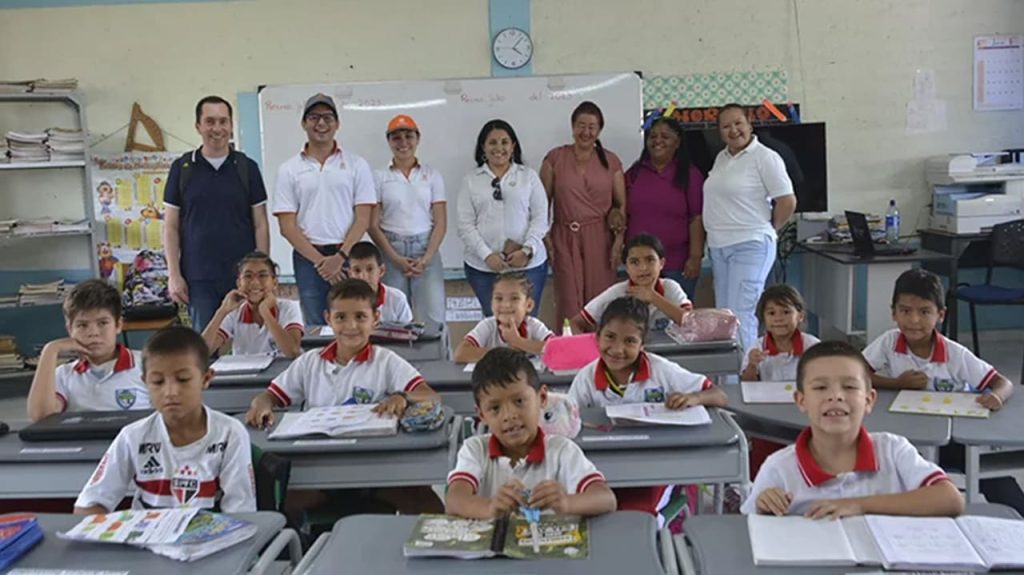
Relevant Facts
With Works for Taxes, Celsia renovated the school furniture of 37 educational centers in Pradera
Topic / Indicator | Own indicators | CSA S&P Indicator | SASB indicator | GRI indicator | TCFD | External assurance |
|---|---|---|---|---|---|---|
Social investment – Total and by line | LGB-02, LGB-03 | – | – | 203-1 | – | |
Social investment – Type and activity | LGB-03, LGB-04 | – | – | 203-1, 3-3 | – | |
Social investment – Beneficiaries | LGB-01 | – | – | – | – | |
Works for Taxes – Number, amount invested and beneficiaries (people) of the projects executed under the framework of Works for Taxes in the category of roads, education, environmental services and other categories. | C-OXI1 | – | – | – | – | |
Number of communities with which we held prior consultations at each stage during the reported year corresponding to the Generation business | C-OXI2 | – | – | – | – | |
Number of communities with which we held prior consultations at each stage during the reported year, corresponding to the T&D business | C-OXI1 | – | – | – | – | |
Total amount executed in previous consultations during the reported year. | C-CP1 | – | – | – | – | |
Breakdown of the communities with which the prior consultation processes were held during the reported year, with their respective Municipalities and Departments. | C-CP2 | – | – | – | – |
A “Thank you” statement from Institución Educativa Antonio José Sucre in Buenaventura
for Celsia’s contribution to the Papachina Festival, within the framework of the commemoration of Afro-Colombian Day: “It feels great to know we have a partner like you that people can count on when we need it.”
A “Thank you” statement from the leaders of the community councils of the black communities of Guaimia and Llano Bajo
for the support provided to guarantee the presence of the Pacific Naval Patrol in the territory, during the two days in which the health brigade organized by these councils was carried out, which served 347 people from the communities of district 8 of Buenaventura.
The award granted by the Association of Peasant Women of Guaimia (ASOMUGUAI, for the Spanish original) to Jane Carolina Dueñas of Celsia,
for her labor and constant work and empowerment of the Afro-Latina women of District 8 of Buenaventura.
POA: Projects, Works and Activities.
EMP: Environmental Management Plan.
DANCP: Directorate of the National Prior Consultations Authority.
TSE: Transfers from the Electricity Sector.
SEE Learning: Social, Emotional and Ethical Learning Program.

